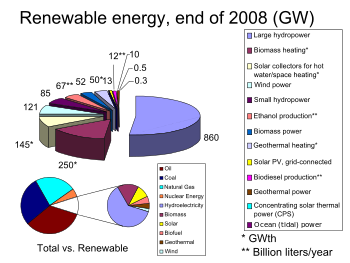 |
| Worldwide Renewable energy, existing capacities, at end of 2008, from REN21.http://www.ren21.net/globalstatusreport/g2009.asp Total energy, is from BP Statistical Review.http://www.bp.com/statisticalreview (Photo credit: Wikipedia) |
Over in the US, the BP corporation has established an Energy Biosciences Institute (EBI) to spearhead extensive new research and development efforts into clean-burning renewable energy sources, most prominently biofuels for ground vehicles. BP's investment comes to $50 million (US) per year over the course of the next decade. This EBI will be physically located at the University of Illinois Urbana-Champaign. The University is in partnership with BP, and it will be responsible for research and development of new biofuel crops, biofuel-delivering agricultural systems, and machines to produce renewable fuels in liquid form for automobile consumption. The University will especially spearhead efforts in the field of genetic engineering with regard to creating the more advanced biofuel crops. The EBI will additionally have as a major focal point technological innovations for converting heavy hydrocarbons into pollution-free and highly efficient fuels.
Also in the US, the battle rages on between Congress and the Geothermal Energy Association (GEA). The GEA's Executive Director Karl Gawell has recently written to the Congress and the Department of Energy, the only way to ensure that DOE and OMB do not simply revert to their irrational insistence on terminating the geothermal research program is to schedule a congressional hearing specifically on geothermal energy, its potential, and the role of federal research. Furthermore, Gawell goes on to say that recent studies by the National Research Council, the Western Governors' Association Clean Energy Task Force and the Massachusetts Institute of Technology all support expanding geothermal research funding to develop the technology necessary to utilize this vast, untapped domestic renewable energy resource. Supporters of geothermal energy, such as this writer, are amazed at the minuscule amount of awareness that the public has about the huge benefits that research and development of the renewable alternative energy source would provide the US, both practically and economically. Geothermal energy is already less expensive to produce in terms of kilowatt-hours than the coal that the US keeps mining. Geothermal energy is readily available, sitting just a few miles below our feet and easily accessible through drilling. One company, Ormat, which is the third largest geothermal energy producer in the US and has plants in several different nations, is already a billion-dollar-per-year business—geothermal energy is certainly economically viable.
